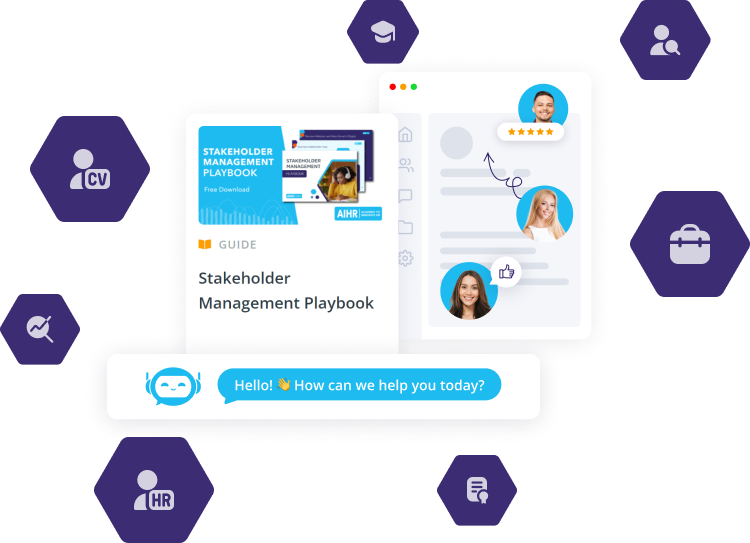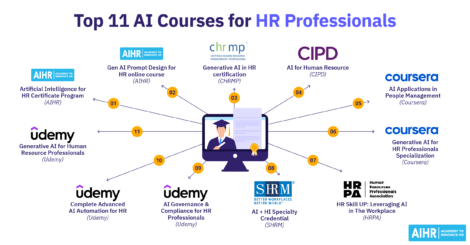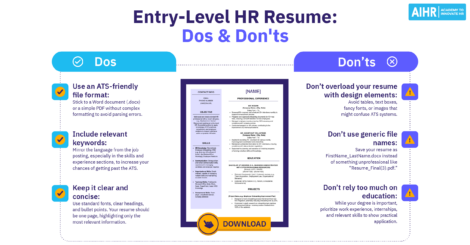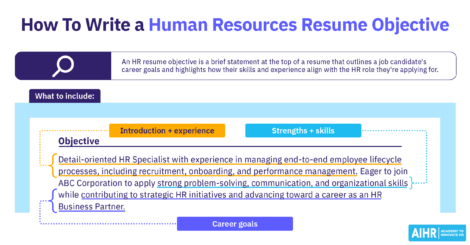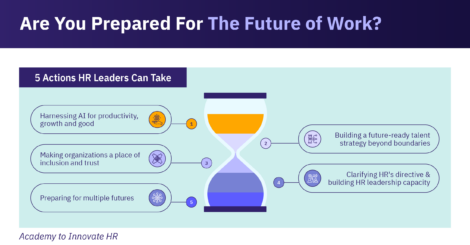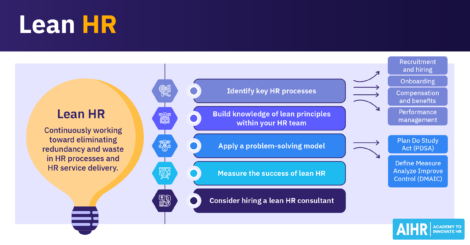11 Change Management Skills for HR To Develop in 2025
“Any change, even a change for the better, is always accompanied by discomforts.” These words by Arnold Bennett fittingly describe what’s at the heart of change management: minimizing the discomforts that come with change.

Organizations are facing more changes than ever, with leaders and employees now handling an average of nine changes per year, compared to just two before 2020.
This constant change can create “change fatigue,” making it harder for employees to adapt. HR professionals play a key role in helping teams successfully manage these transitions.
This article breaks down 11 essential change management skills that HR practitioners should develop to better support their workforce during ongoing organizational changes.
Contents
Why change management is essential for HR
11 crucial change management skills and how to develop them
Examples of change management skills in practice
Why change management is essential for HR
Change is a constant in most organizations. For these changes to succeed, it’s important to prepare, equip, and support employees so they can adapt and embrace new ways of working. This process is called change management, and HR plays a key role in managing the people side of change.
To guide employees through change effectively, HR needs strong change management skills and knowledge. This includes:
- Monitoring and evaluating the process, and improving strategies if required
- Communicating clearly and addressing concerns
- Supporting both leaders and employees as needed
- Ensuring the change aligns with the company culture
- Providing training and development for employees.
Why do change management skills matter for HR?
Today’s workplaces are experiencing change—rapid advancements in AI, shifts toward remote and hybrid work, and economic changes are just some of the current challenges organizations face.
This puts HR teams front and center in understanding and effectively managing change within the workplace. However, to succeed in this role, HR professionals need strong skills, knowledge, and expertise in managing change.
So, what exactly are change management skills? These are the abilities needed to guide, support, and implement change effectively. They help HR leaders manage transitions, keep employees engaged, and drive business success.
Enhance your HR expertise by building a complete set of skills that not only elevate your HR career but also drive meaningful business impact.
AIHR’s Full Academy Access offers you all the tools to succeed in HR, providing full access to Certificate Programs, mini courses and resources covering everything from HR leadership competencies to the tracking, measuring and analyzing of people analytics.
11 crucial change management skills and how to develop them
Let’s examine some essential change management skills for HR professionals. We’ll also discuss their relevance and how to start developing them.
Skill 1: Communication
Communication in change management means delivering clear, consistent, and engaging messages about organizational changes. It involves explaining the reasons for change, providing regular updates, addressing concerns and resistance, using the proper communication channels, and ensuring open communication.
Why it’s an important skill:
- Reduced uncertainty and builds trust: Employees feel more secure when they understand the change process, strengthening their confidence in leadership.
- Minimized resistance: Employees are more likely to support change when they understand its benefits, not just for the organization but also for themselves and how they handle their day-to-day work.
- Enhanced engagement: When people feel heard and included, they are more motivated to engage with the company and adapt to organizational change.
How to develop this skill:
- Practice active listening: Encourage employees to share their concerns and ideas and address their feedback promptly to show them their input matters to the company.
- Ensure clarity and simplicity: Avoid jargon or overly technical terms, and use simple, direct language to facilitate understanding. You can also break more complex messages into smaller, more digestible pieces.
- Adapt your communication style: Assess employee preferences and company culture to determine the best communication style for your audience while maintaining the organization’s voice and intent.
- Tap into storytelling: Share real-life examples of how the change has benefited others, and use narratives to make it feel more relatable and less intimidating.
Skill 2: Adaptability
Adaptability in change management refers to people’s ability to (quickly) adapt to changing circumstances or situations in the workplace. Although always handy, this skill is particularly useful in periods of change as things can evolve rapidly.
Why it’s an important skill:
- Enables smoother transitions: HR leaders who act quickly are likelier to make the change happen and drive a smoother transition during organizational change.
- Willingness to take risks (and fail): Adaptable people aren’t afraid to take (calculated) risks. They’re open to trying alternative approaches and potentially failing; if they fail, they learn and grow from that experience.
How to develop this skill:
- Work on your growth mindset: Be open to trying and learning new things. If you find this hard, find an accountability partner to help you.
- Develop self-awareness: Self-awareness is about knowing your strengths, weaknesses, values, and beliefs. Knowing this about yourself will help you identify how you react to change and detect potentially limiting beliefs that negatively affect your adaptability.
- Build resilience: Learn how to better deal with setbacks and challenges and grow stronger because of them.
Skill 3: Problem-solving and decision-making
Problem-solving and decision-making skills in change management enable people to identify the source of an issue during a change process, brainstorm and find one or more solutions, and make the necessary decisions to solve it.
Why it’s an important skill:
- Ensures a smooth process. Change is rarely linear; unexpected roadblocks are likely to pop up. Problem-solving and decision-making are important change management skills, as they allow one to assess situations from multiple perspectives and devise creative ways to address them.
How to develop this skill:
- Learn about problem analysis techniques: Finding the right solution to a problem can be complicated. However, knowing about and using the correct problem analysis technique can streamline the entire process.
The following techniques provide teams with a step-by-step procedure to recognize and solve potential difficulties:- Problem tree analysis
- Root cause analysis
- CATWOE analysis
- Kepner Tregoe analysis
- SCAMPER analysis
- Practice: Once you understand the different problem analysis approaches, you can start practicing conducting a problem analysis, for example, by following the steps mentioned in our article about problem analysis in HR.
Skill 4: Collaboration
Collaboration is about working well with others. In a way, it is the combination of someone’s ability to communicate, adapt, problem-solve, and achieve goals with others.
Why it’s an important skill:
- Necessary for a successful process. Organizational changes usually affect many, if not all, the people in the company. Effective collaboration is, therefore, crucial for success; without it, it is very unlikely that the planned change will take place, let alone have the desired effect.
How to develop this skill:
- Work on your communication skills. Communication is an essential part of collaboration. Focus on improving your active listening, communication style, and use of jargon.
- Build your problem-solving skills. As mentioned earlier, learn about the different problem-solving techniques, practice, and train yourself to see every potential issue as an opportunity to learn and grow.
- Develop your adaptability. Successful collaboration requires adaptability from those involved. Things won’t always go as you pictured them, so be open to other perspectives and willing to change course.
Skill 5: Leadership
Leadership is the ability to lead, influence, or guide others. Strong leadership offers clarity and stability, both much needed during periods of transformation and change that often come with uncertainty.
Why it’s an important skill:
- Provides stability and clarity. Organizational change can create uncertainty and fear for its participants. Strong leadership gives them the reassurance, context, and direction they need to guide them through the transition.
How to develop this skill:
Developing leadership competencies involves:
- Assess strengths and weaknesses: Take a leadership skills assessment to pinpoint areas for improvement.
- Choose a development method: Select the best way to build your skills, like coaching, mentoring, formal training, workshops, or job shadowing.
- Build a development plan: Create a personalized and structured leadership program.
Skill 6: Negotiation
Negotiation in change management refers to someone’s ability to communicate with various stakeholders and come to an agreement.
Why it’s an important skill:
- Ensures effective change. Every organizational change involves different stakeholders with different interests. Finding a solution that guarantees an outcome where all parties can find themselves is crucial for success.
How to develop this skill:
- Remember the 5C’s. As a negotiation rule of thumb, remember to communicate, collaborate, compromise, stay calm, and embrace change.
- Develop the skills related to the 5C’s. To become good at negotiating, work on your communication, collaboration, adaptability, and resilience, as described in this article.
Skill 7: Resilience
As we’ve seen earlier, things happen, problems occur, and circumstances evolve during a change process. Resilience helps you better deal with the unexpected and navigate a quickly changing environment.
Why it’s an important skill:
- It improves your wellbeing. Resilience is mandatory during a time of change. It is the basic attitude for anyone involved in change management, as without it, most people’s (mental) health risks deteriorate.
- It inspires others. Another reason resilience is one of the most important change management skills for leaders is that it inspires other people in the organization to become more resilient themselves, which is good in any situation but even more so in periods of change.
How to develop this skill:
- Develop self-awareness. Once you know how you react in certain (unexpected and) difficult situations and why, you can work on this to better deal with them – and even grow from them – in the future.
- Take care of yourself. The better your overall health is, the better you will be able to navigate hardship if it occurs. Get at least the basics right: eat well, go outside, exercise regularly, and get enough sleep.
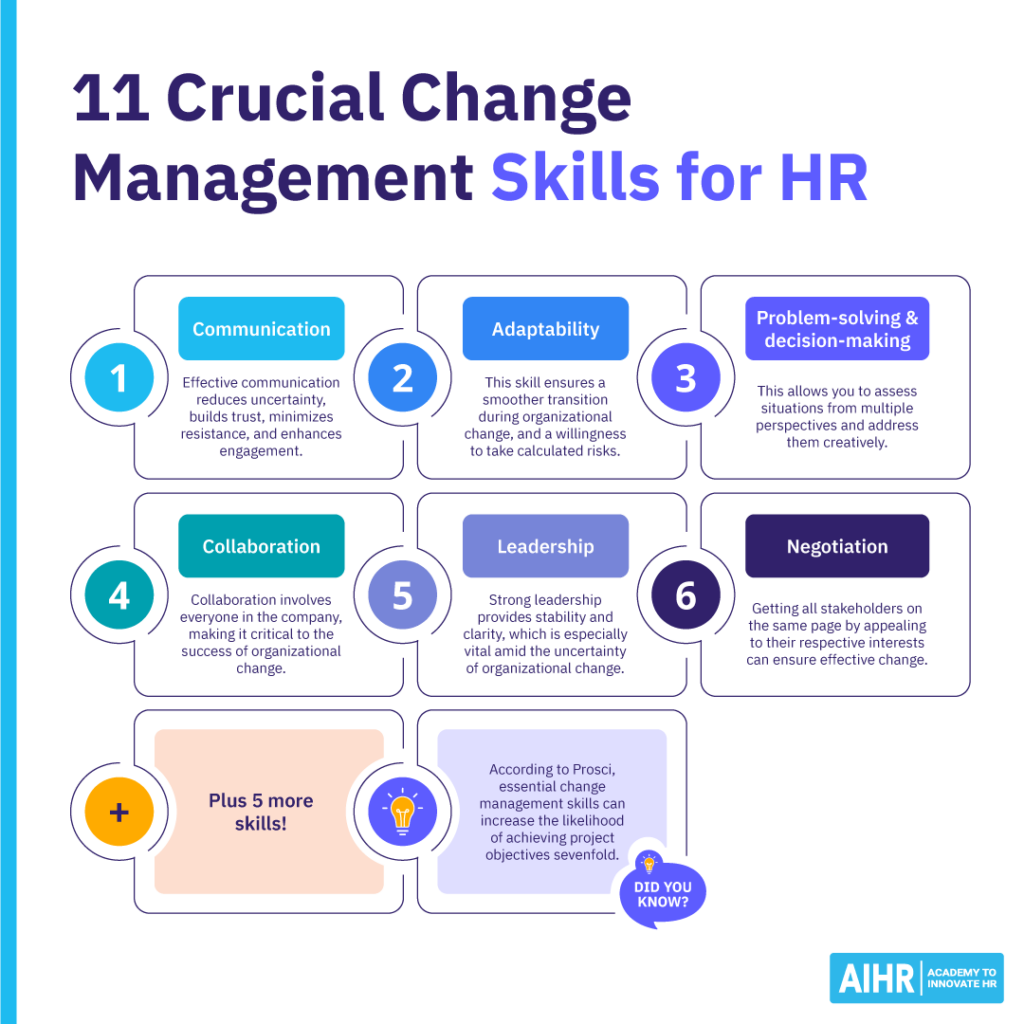
Skill 8: Cultural awareness
Cultural awareness in change management means understanding the company’s behaviors, values, and norms and how they will affect the change process.
Why it’s an important skill:
- Choosing the best strategy. Your change strategy and process may differ depending on the organizational culture. Change management will look very different in an adhocracy culture (dynamic and entrepreneurial) than in a hierarchical culture.
- Minimizing resistance. Cultural awareness enables you to choose a change strategy that best fits the organization and, as a result, minimizes the chances of people resisting the proposed change(s).
How to develop this skill:
HR plays a key role in understanding and maintaining a company’s culture. They ensure that candidates learn about the organization’s values and cultural traits right from the application process.
- Conduct a company culture audit: Learn how to conduct a culture audit and analyze the data to understand the current company culture and assess where improvements are required.
- Measure culture: Continue to measure the company culture to understand if the changes required are happening or where there may be other areas to address.
Skill 9: Coaching and mentoring
Coaching and mentoring are important to change management leadership skills. Especially when it concerns organization-wide change processes, the change management team depends on the support and involvement of managers to create the desired change.
Why it’s an important skill:
- Managers need support: Managers often have a lot on their plate, and leading their teams through organization-wide changes adds extra work and stress. They need guidance and support from HR to follow the process effectively.
- Creating change advocates: Managers are key to helping their teams understand and embrace organizational changes. Their role is critical in getting everyone on board. HR needs to support managers in becoming advocates for change.
How to develop this skill:
- Experience coaching yourself. As Ozlem Sarioglu, Founder of Digital coaching platform SparkUs, said in our All About HR Podcast: “If you haven’t received coaching yourself, you don’t really grasp what it means to be coached, what it feels like when you hear a powerful question to search inside yourself and find an answer. So to become a better coach, you need to be coached first.”
The same goes for mentoring. Before becoming a mentor, find one first and experience what that is like. - Get proper training. Find someone with experience, specifically coaching managers during organizational change, to give you the appropriate training.
Skill 10: Data analysis
HR data analysis skills allow for a more informed and strategic approach to organizational change management, allowing the organization to make data-driven adjustments where needed.
Why it’s an important skill:
- Track progress: Data analysis helps you to track the progress (or lack thereof) of your change initiatives.
- Identify potential problems. Tracking your change management metrics helps you detect potential issues and optimize the change process.
How to develop this skill:
Develop your skills in tracking and measuring the right HR analytics for your change management initiatives:
There are, however, some things you can do:
- Understand which metrics to track: Check out our article about important change management metrics to track and how to analyze them.
- Take a certificate program: Learn how to measure and analyze HR metrics by taking a course or program, like the AIHR People Analytics Certificate Program.
Skill 11: Crisis management
Crisis management in a change process refers to people’s ability to effectively navigate and respond to unexpected situations and emergencies during a planned organizational change.
Why it’s an important skill:
- To minimize the damage: Staying calm in a crisis and, if possible, following processes for calamities is essential to reassure everyone in the organization and reduce damage (e.g., employee safety, a loss in productivity, a drop in employee engagement, a data breach, etc.).
How to develop this skill:
Crisis management relies on many of the same skills as change management, including communication, collaboration, problem-solving, decision-making, adaptability, and resilience. To be well-prepared, it’s important to anticipate potential crises and create clear action plans ahead of time.
By adding these strategies to your change management plan, you can respond quickly and effectively to challenges.
3 examples of change management skills in practice
There are various ways for HR professionals to put their change management knowledge and skills into practice. Examples include:
Example 1: Managing digital change
When a company introduces new HR software, the HR team must manage the digital change that comes with it. This includes clear communication and fostering resilience. These change management skills help to:
- Effectively introduce the new HR software through clear communication
- Encourage behavioral changes and build resilience among employees.
Example 2: Writing change, communication, and crisis plans
HR’s expertise in change management is essential for planning and guiding organizational transitions. This includes creating clear communication strategies to make the process smoother. HR is also key in preparing crisis plans to handle any unexpected challenges that might come up during the transition.
Example 3: Guiding people through mergers and acquisitions
When one company acquires and merges with another, effective change management is essential at many levels. Here are a few key areas to consider:
- Organizational culture: How well does the acquired company’s culture align with the acquiring company’s? What steps can you take to successfully merge them?
- Employee engagement: How do employees from the acquired company feel about the transition? Are they concerned? What’s the impact on their morale and engagement? How can you keep these positive?
- HR tech stack: Does the acquired company’s HR tech stack integrate smoothly with the acquiring company’s systems?
To sum up
Focusing on key skills such as clear communication, adaptability, problem-solving, collaboration, leadership, negotiation, resilience, cultural awareness, coaching, data analysis, and crisis management can help guide your organization through transitions more smoothly.
Investing in these areas not only enhances your professional growth but also strengthens your organization’s ability to lead change successfully, reducing employee resistance and boosting overall agility. As the pace of change continues to accelerate in organizations, being well-equipped with robust change management capabilities positions you to lead your teams effectively, ensuring sustained growth and competitiveness in today’s business landscape.
Learn more
Related articles
Are you ready for the future of HR?
Learn modern and relevant HR skills, online

